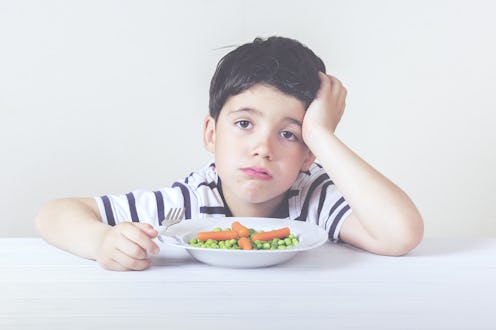News
Not So Great News For Picky Eaters

If eating anything leafy, borderline funny-looking, or even mildly nutritious horrified you as a kid, you're probably not alone. Kids are kinda the worst when it comes to eating what's on their plate — especially if they catch wind that it's good for them. But according to a Duke University study, published Monday in the journal Pediatrics, super picky eaters can actually become depressed and anxious adults later on. Translation? That deeply intense aversion to broccoli of yours could have been a sign of something more serious.
Of course, I'm not just talking about a kid who refuses to eat a vegetable until you smother it with cheese (aka my preferred method of vegetable eating as a kid... and as an adult). As lead study author Nancy Zucker points out, the kind of "picky eater" researchers are identifying here, which they call "selective eaters," operate on a slightly different plane. "If you give these kids a new food often times they'll gag," Zucker told The Guardian. "It's so repulsive to them that their reflexive gag response will kick in. They couldn’t go to birthday parties, to the cafeteria – or [sic] forget overnight camps."
And those kids, according to researchers, have a much greater risk of developing things like clinical depression, anxiety, and Attention Deficit Hyperactive Disorder as they age. What's more, the symptoms actually get more extreme the pickier the eater gets — some are almost twice as likely as others to be later diagnosed with depression.
Zucker and her fellow researchers shared their findings in the report, entitled "Psychological and Psychosocial Impairment in Preschoolers with Selective Eating," which surveyed 3,400 between the ages of 2 and 6, and identified 917 of them to be so-called "selective eaters."
But researchers do want to make one thing clear: This news shouldn't cause parents to immediately freak out that their asparagus-loathing kid is necessarily doomed to develop one of the conditions. "What I don't want to do with the reporting of the story is to create panic among the parents," Zucker said. "To pathologize something that’s not pathological." Still, for parents who can barely get their kids to eat their plates, or find mealtime to be an increasingly difficult struggle, Zucker urged them to consider calling their doctor and seeking professional help.
As The Guardian notes, it's kind of amazing that despite how incredibly common food issues are among kids, there isn't much data on the topic to date — at least according to the researchers behind it. There is, however, a longitudinal picky eating study that's going on now at Stanford University, where researchers have been reportedly following the eating preferences of nearly 80 children, from birth to age 11. (Can't wait to see what that turns up.)
Image: Getty Images